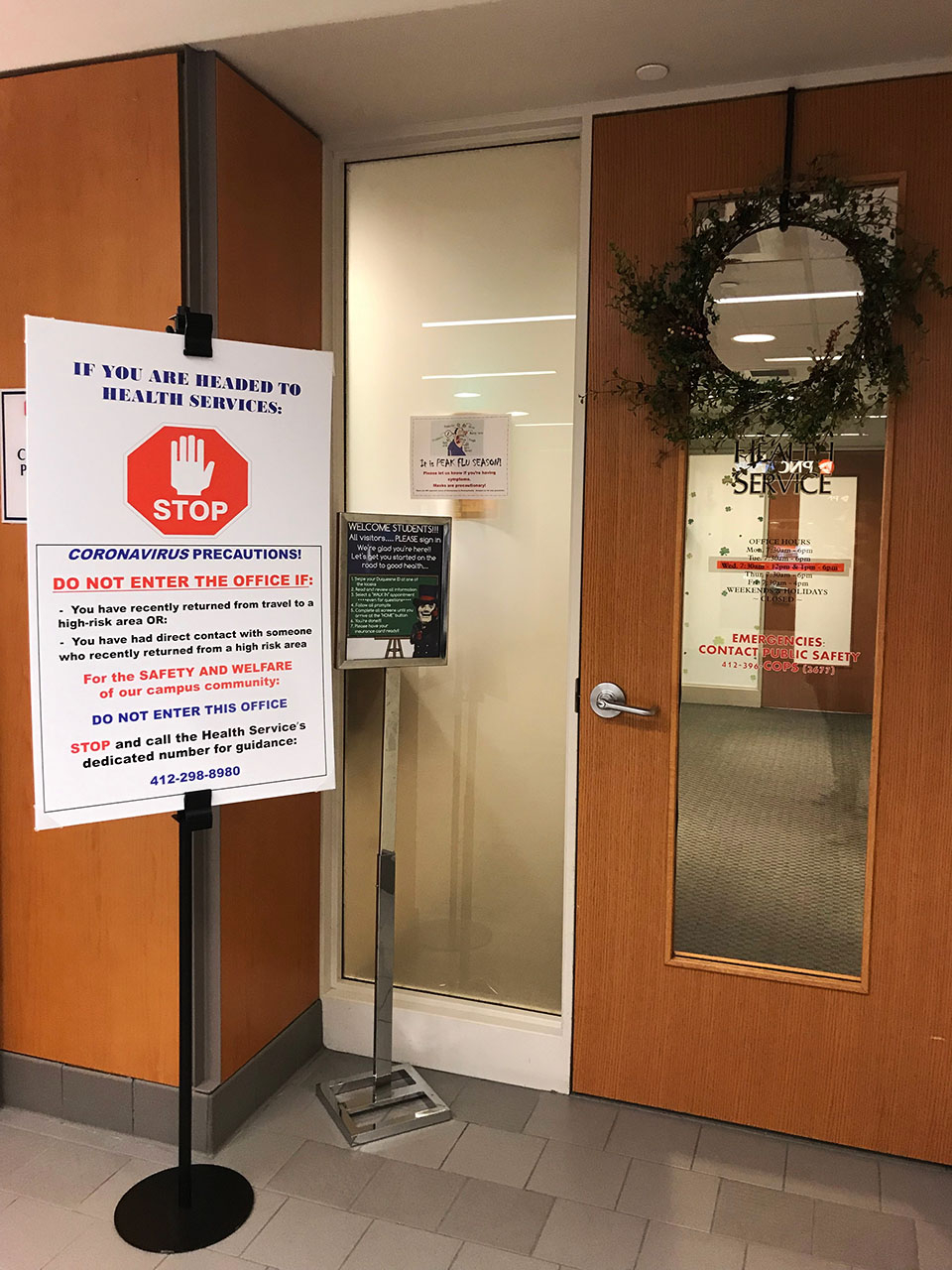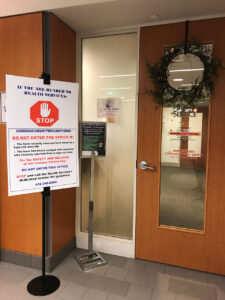

03/12/2020
Hallie Lauer | news editor
In a statement sent out to students on March 11, Duquesne University announced that all classes are being transferred from traditional classroom learning to online courses, effective March 18 and ending March 31 due to the threat of the spread of the coronavirus, COVID-19.
This announcement came after other schools in the area, including the University of Pittsburgh, Carnegie Mellon University, Robert Morris University and Chatham University, also moved from their in-person classes to online-only education.
“We feel keenly our duty to provide the educational experience you expect. The decisions we make are designed to keep our people and our campus safe while preserving as best as possible your ability to progress in their education,” the statement said.
As of publication time, there were no confirmed cases of the coronavirus in Allegheny County.
The statement went on to say that if needed, the university would consider extending the online class protocol past March 31. Advance notice will be given if that is to happen.
“It’s surreal, as I never would have guessed this would have happened. I understand that it is for prevention purposes, but it is a shame that I might not get to enjoy senior events because of it,” said senior communications major Julie Loesch. “I am a commuter, so I feel I will be missing out on seeing all my friends at classes and interacting with my professors. Online classes just aren’t the same as being there and interacting in person.”
In addition to the shift in class policy, the university has also canceled any on-campus event that is expected to have more than 50 people in attendance. The City of Pittsburgh, in a press conference held Wednesday, March 11, announced that it would also cancel all meetings that required more than 50 people present.
The future of other events, like the commencement ceremony scheduled for May 8, remain uncertain.
“I would really like to be able to walk at my graduation ceremony because I have worked for four years in order to have that moment,” Loesch said. “In terms of actually graduating, I know Duquesne is working to make sure the online classes count towards my credits so I am not worried on that front.”
“Duquesne owes me a degree no matter what,” senior political science major Weston Waite said. “Whether that means I finish my classes behind a computer screen, in a bubble or not at all, I’m getting my degree at the end of this term.”
Residence halls will remain open during this time for students living on campus. According to the university’s statement, facilities have “enhanced their usual cleaning practices to follow best-practices for prevention and sanitation.”
Campus dining will also operate as normal; however, dining protocols will be modified slightly. All cashiers will wear gloves, silverware will be passed out to diners rather than pulled from an open holder and pastries and bagels, where previously self-served, will now be pre-wrapped.
All use of personal reusable cups, mugs and bottles has been temporarily halted. The Chobani Yogurt Bar will also be unavailable during this time. Gloves will be available at The Incline for the use of condiments, beverage station and the hoagie order forms.
All areas also have plans to “increase and enhance sanitization and cleaning of all surfaces and touch points.”
“Why we are keeping public facilities open … is beyond me. You have much larger crowds in a public space than you do in a classroom. Either close campus entirely or don’t close it at all,” Waite said.
Through all of this, though, the university will remain open; students will still be able to access the library, Power Center and the dining halls. Employees are being told to report to work as usual, however it is still unclear whether that includes students with work study jobs or not.
Some academic advisors have changed their face-to-face scheduled appointments for class registrations to phone or email appointments.
Though many common areas where students tend to gather will remain open, the university administration is recommending preventative measures, which include the social distancing that is recommended by the CDC.
“I understand there was probably a lot of pressure from parents, and we want to be as cautious as possible. However, we will still have all the facilities open, meaning everyone will still be in contact with each other,” Loesch said. “I understand that not everyone has the ability or means to go home, but I feel if everyone is going to be on campus anyway we should just continue to meet in person.”
The social distancing recommendations include avoiding congregate settings and mass gatherings and, when possible, keeping a distance of about 6 feet from other people.
This social distancing is also part of the reason that the City of Pittsburgh has decided to cancel the Saint Patrick’s Day Parade.
This will be the third cancelation in Pittsburgh St. Patrick’s Day Parade history. In a news release put out by city officials on Wednesday, March 11, they announced that due to the spreading of the coronavirus, the parade has been canceled.
“Due to ongoing concerns over the rapid spread of the COVID-19 virus, the City of Pittsburgh today is joining cities around the globe – including Boston, Chicago, San Francisco, Philadelphia and Dublin, Ireland – in canceling the St. Patrick’s Day parade planned for Saturday, March 14,” the release stated.
The parade, which began in 1869, wasn’t a yearly occurrence until 1950. It was canceled once in 1903 and 1956 for weather related issues, however in 1993 when Pittsburgh experienced a blizzard, the parade still went on.
This announcement came hours before Duquesne’s decision to move classes online.
Gov. Tom Wolf signed the Commonwealth of Pennsylvania into a state of emergency on Friday, March 6, after two confirmed cases were announced in the eastern part of the state. As of publication there were 16 confirmed cases.
“First and foremost, we want all Pennsylvanians to be safe and remain healthy and follow the practical advice of the Department of Health on ways to protect yourself from any virus and that’s by washing hands, covering your mouth and nose when you sneeze or cough and staying home if you are sick,” he said in a press release.
The Department of Health recommends washing your hands with soap and water for at least 20 seconds and using alcohol-based hand sanitizer if soap and water are not available. People who are not feeling well should also stay home until they are feeling better.

